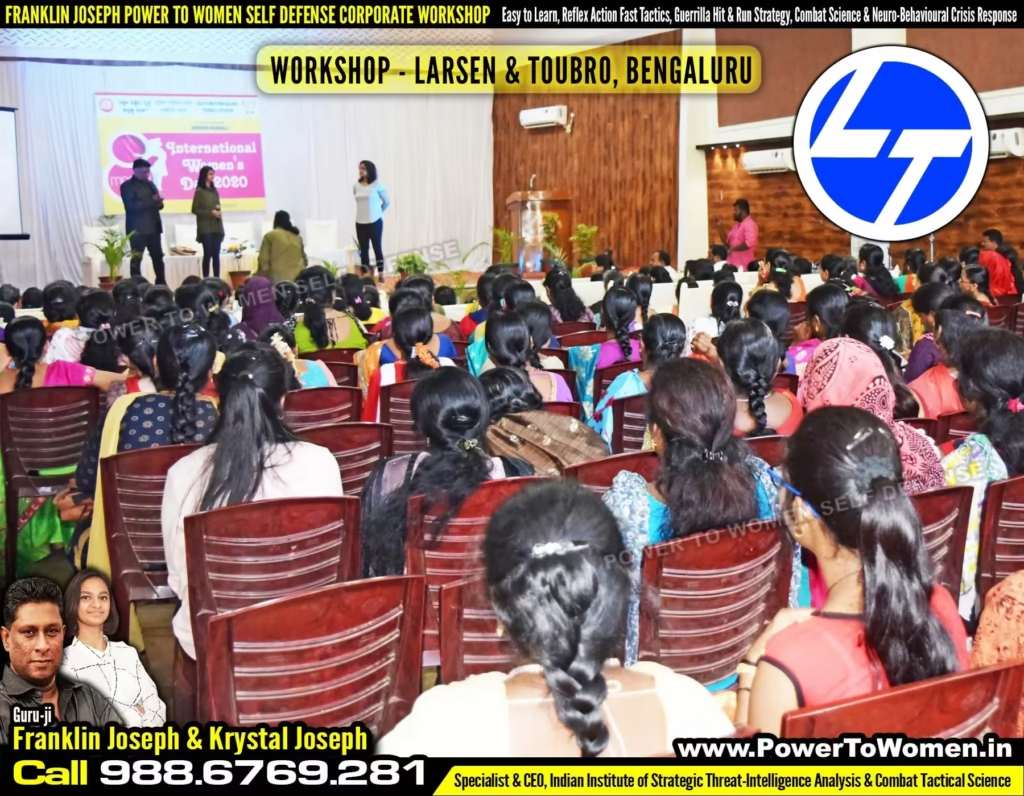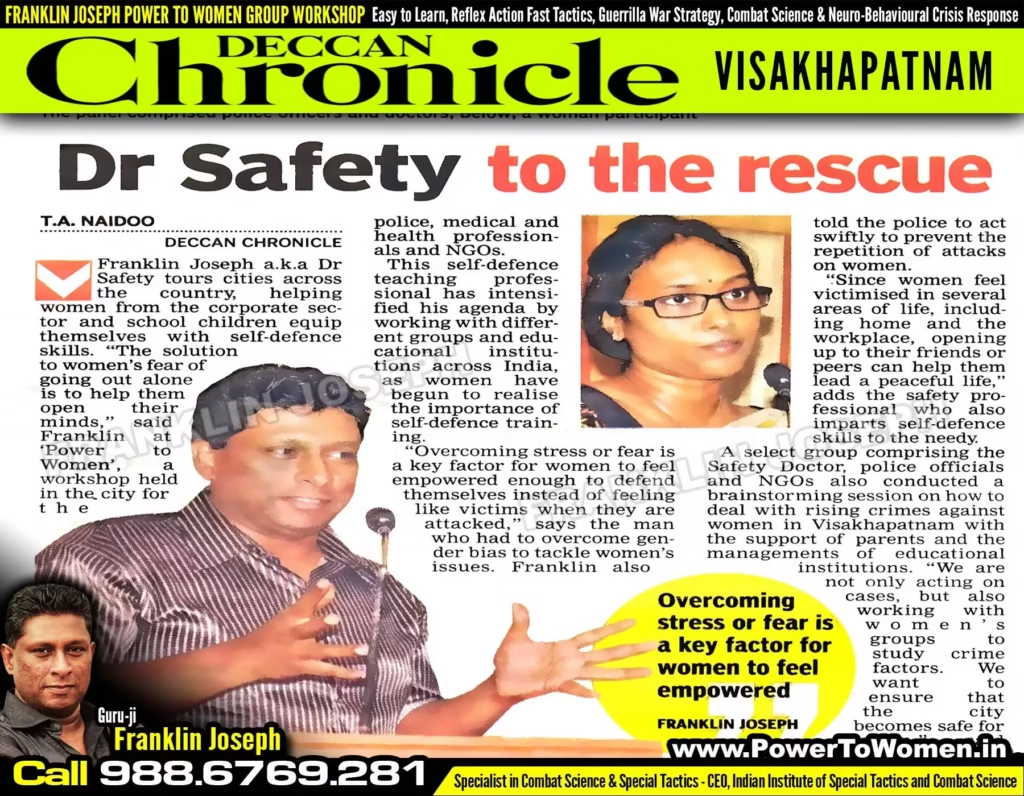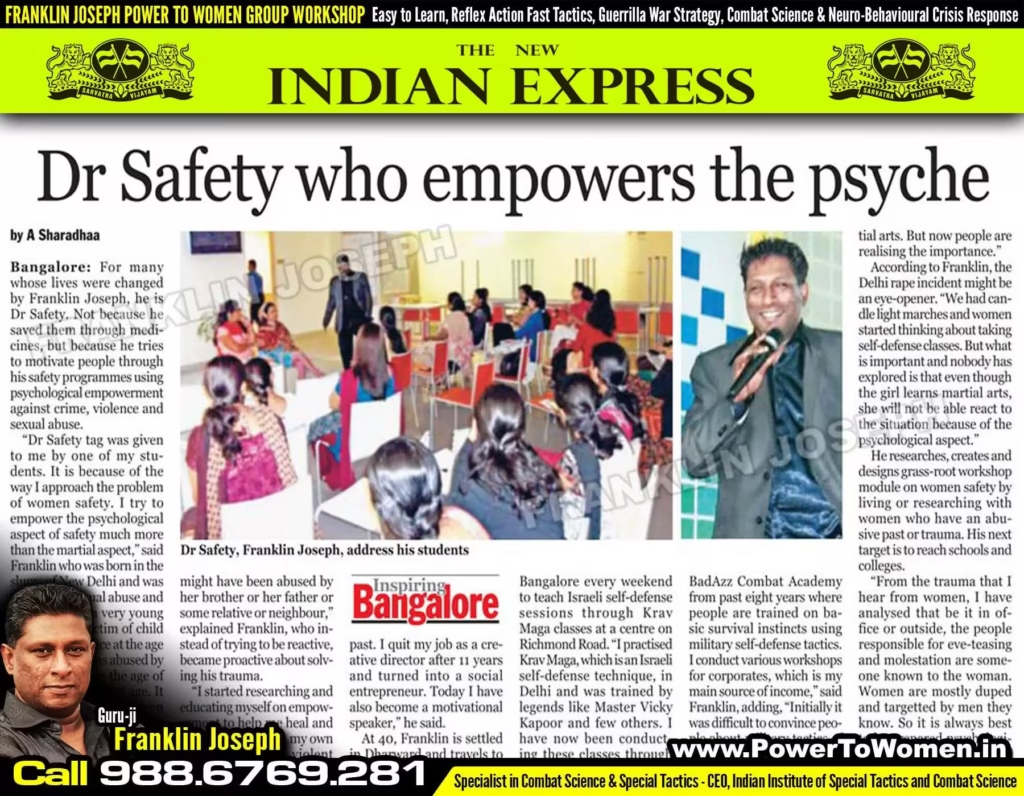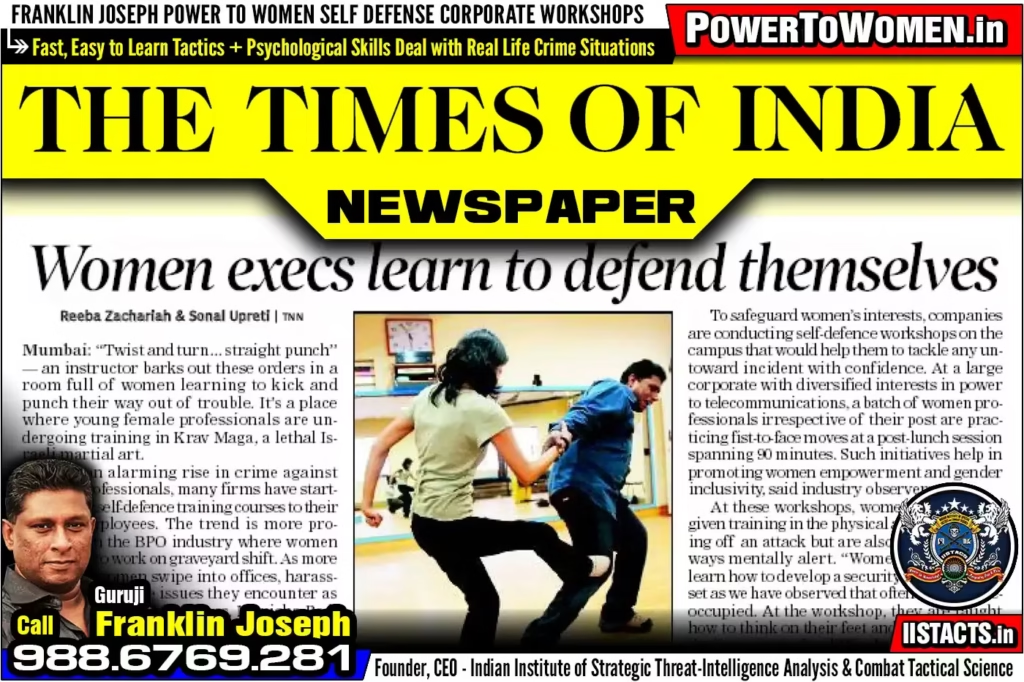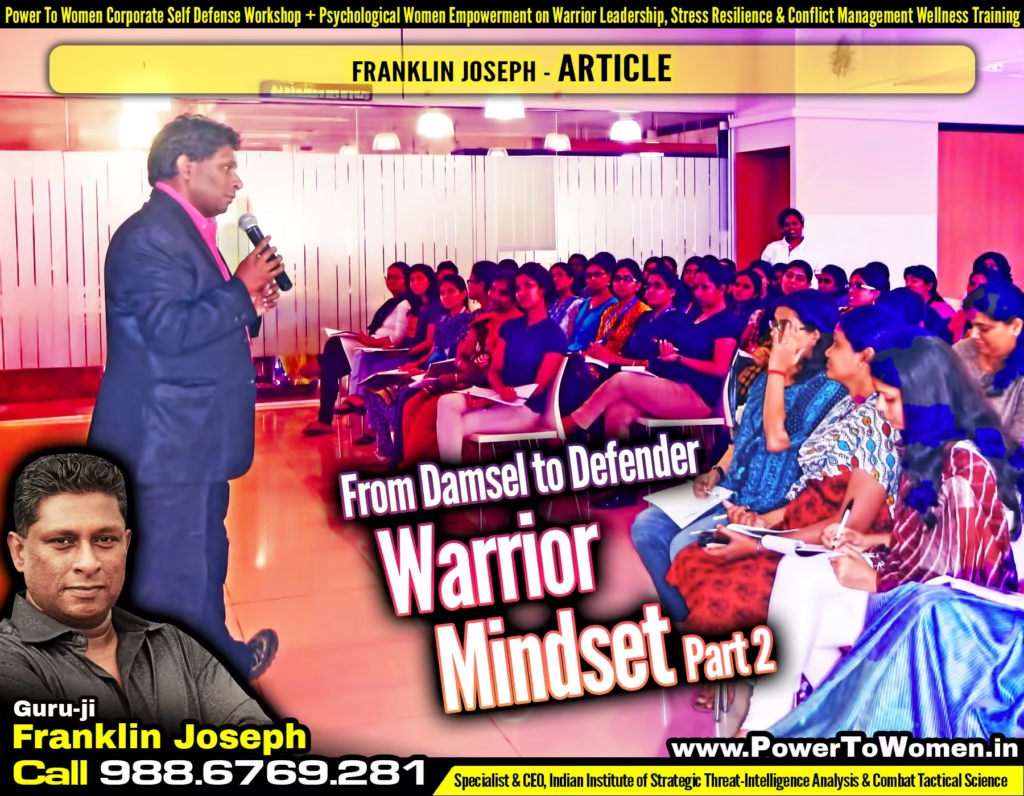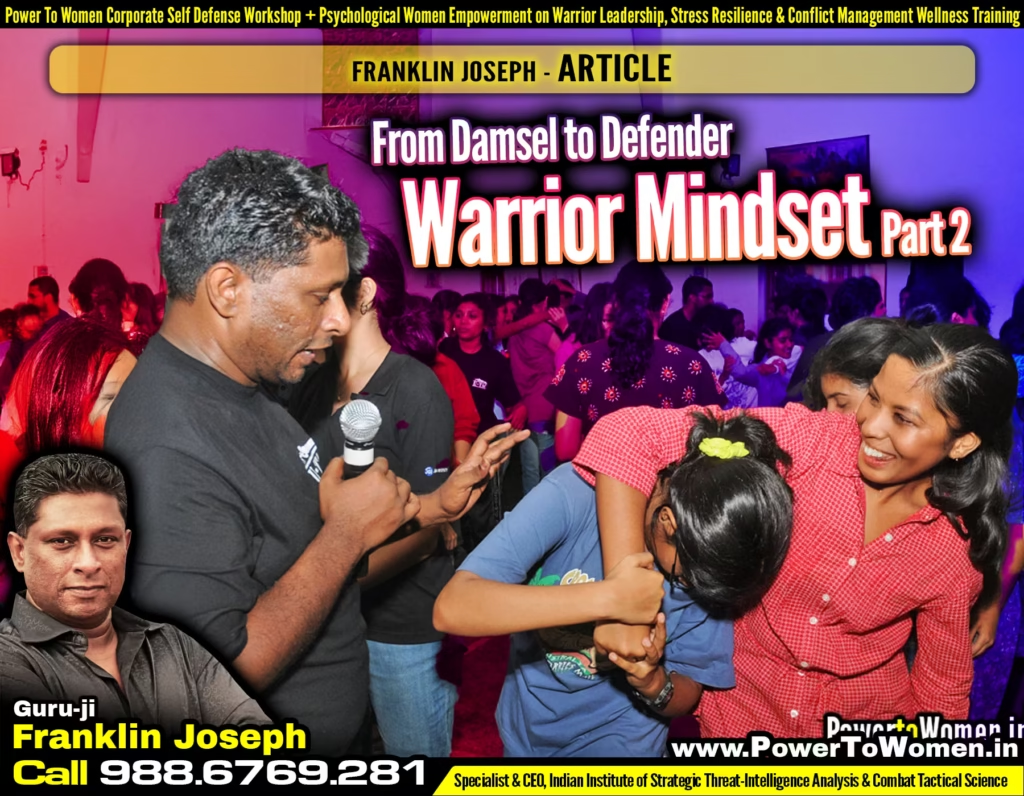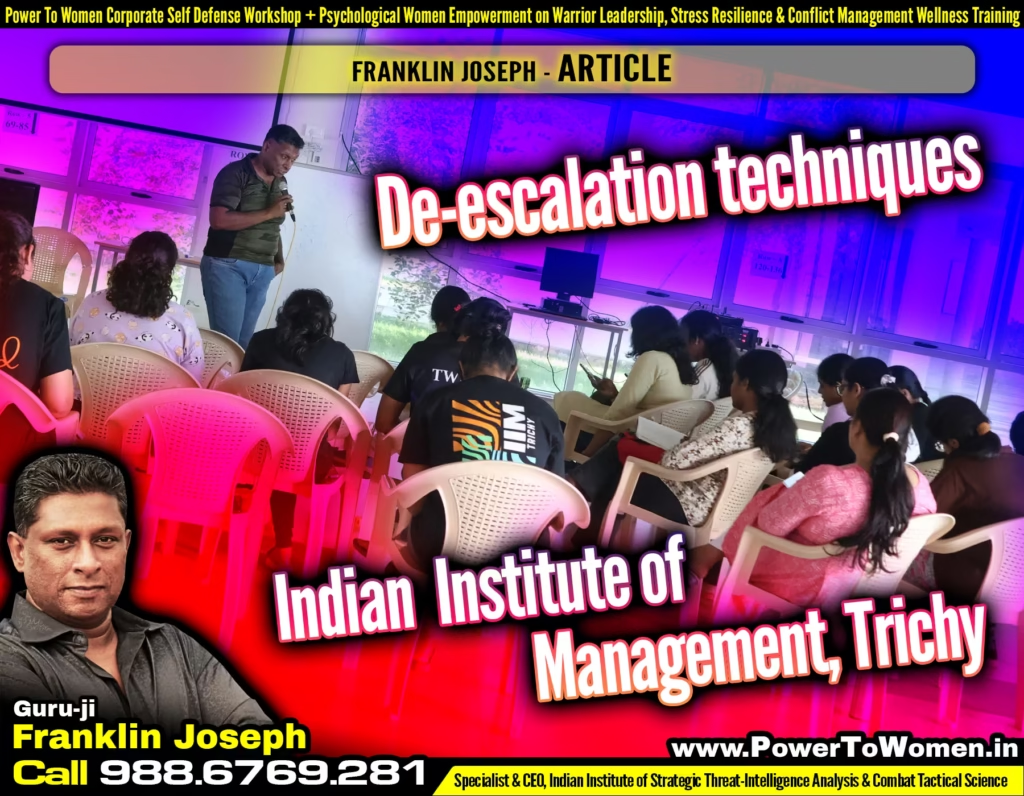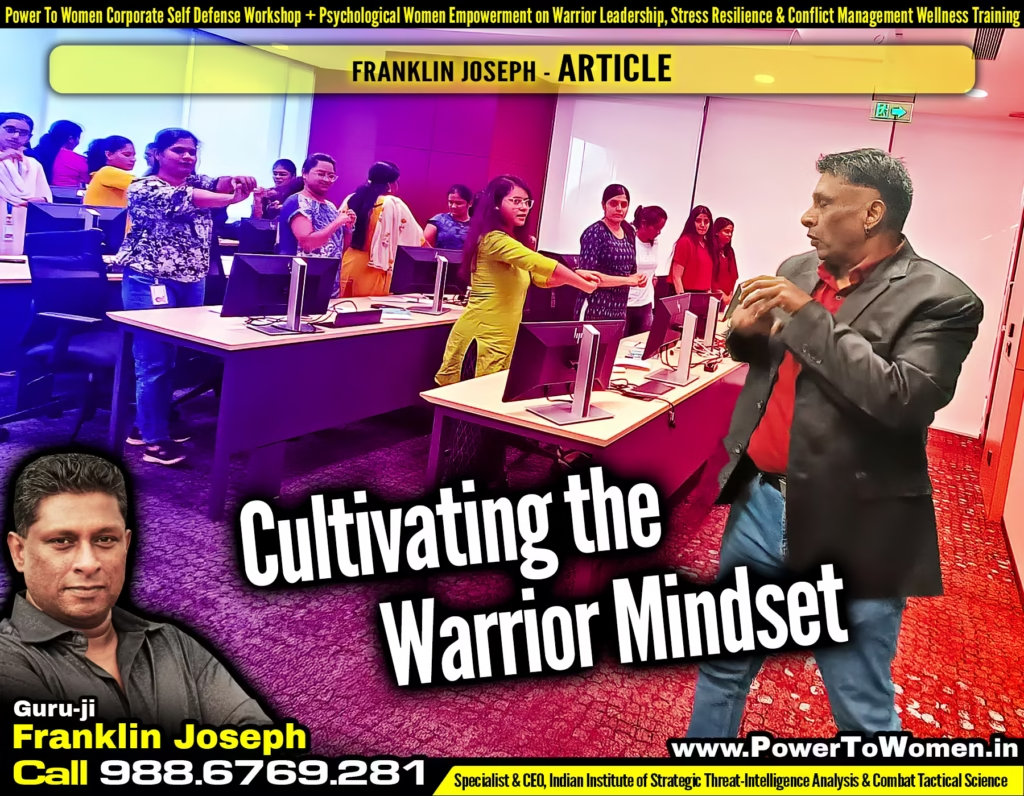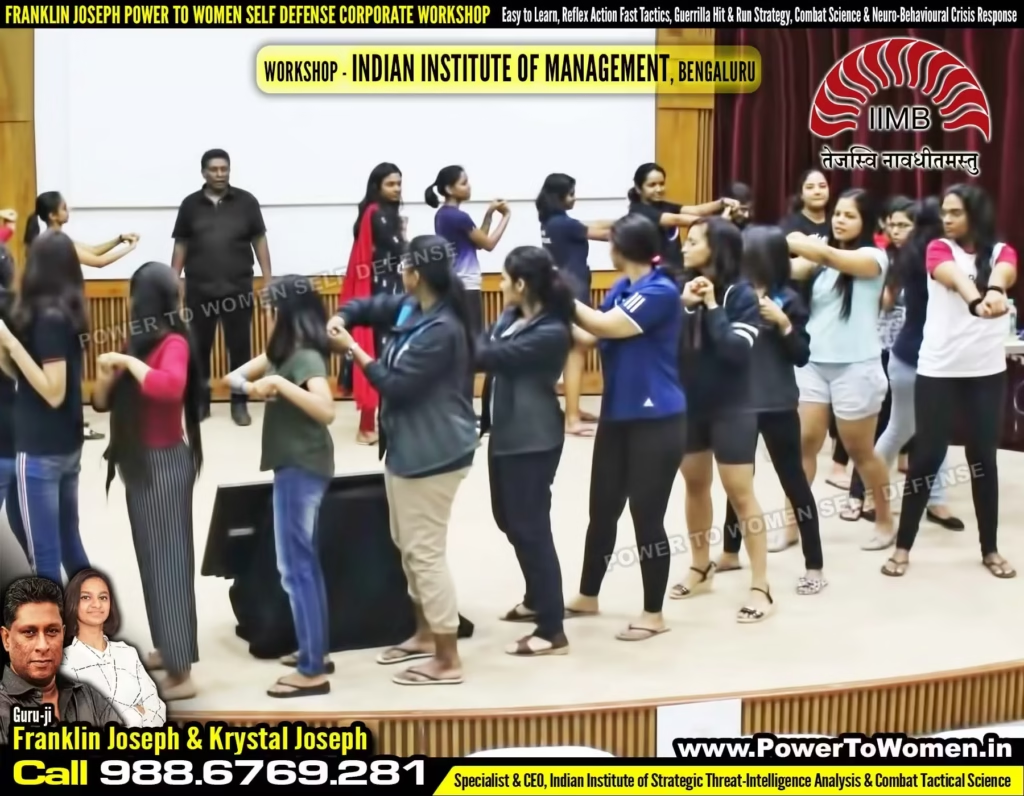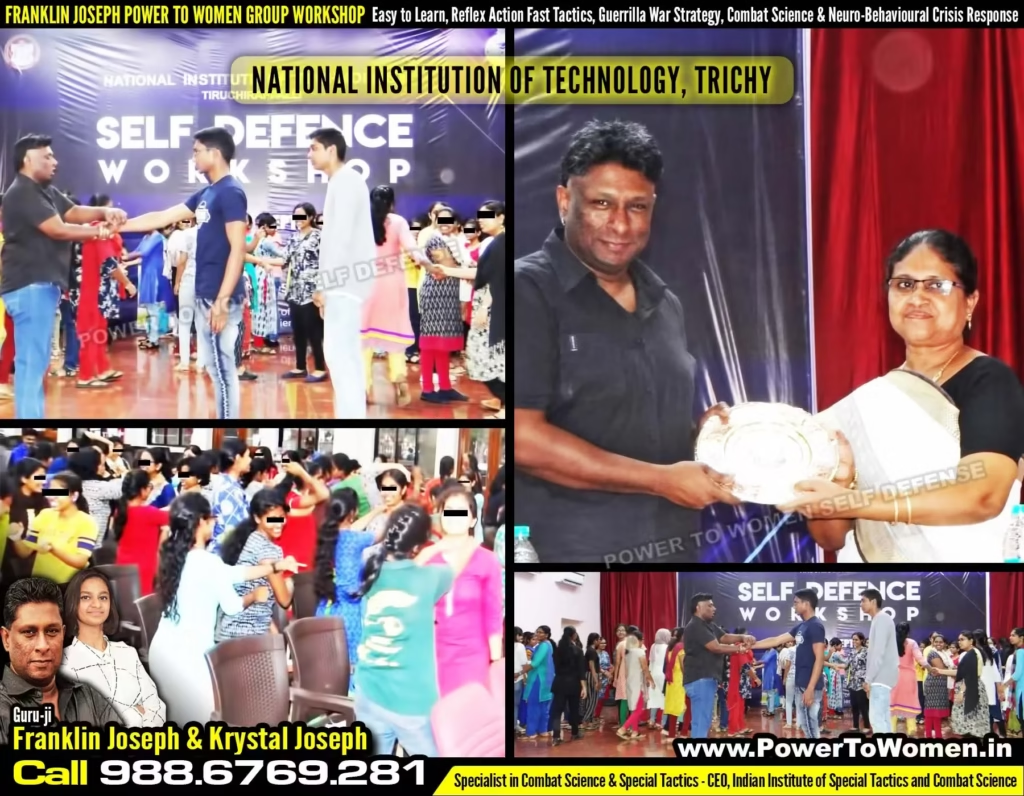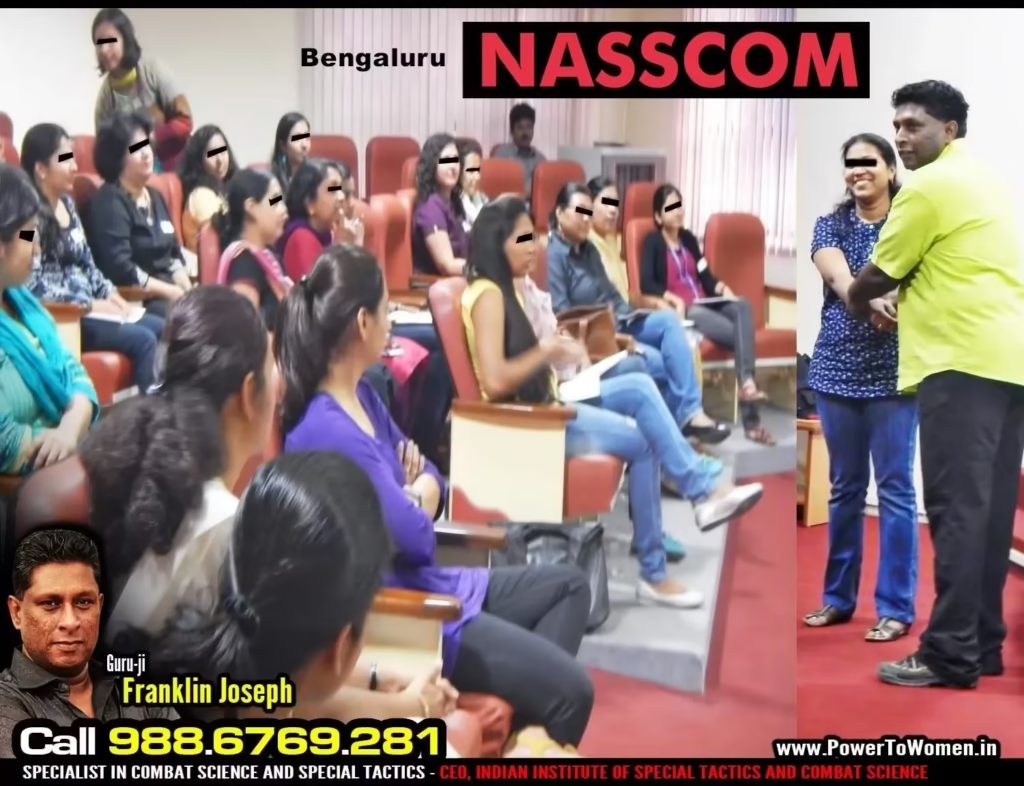Last updated on August 16th, 2025 at 08:44 pm
Read Franklin Joseph Corporate Women Empowerment / Self Defense ArticlesCall 9886769281 for Corporate WorkshopsArticle written by Specialist Guruji Franklin Joseph
Safety Specialist Guruji Franklin Joseph, a Social Entrepreneur & Founder of Franklin Joseph PowerToWomen.in ~ Corporate Krav Maga Self Defense Workshop with Psychological Leadership Empowerment, Stress Resilience & Crisis Management Training.
‘Dr. Safety’ a.k.a. Guruji Franklin Joseph also the CEO of the Indian Institute of Strategic Threat Intelligence Analysis and Combat Tactical Science.
Breaking the Silence – Understanding Sexual Harassment and Eve-Teasing
The terms “sexual harassment” and “eve-teasing” indicate a number of inappropriate behaviors that violate the safety and dignity of people, mostly women. Any unwanted sexual advances or requests for sexual favors, frequently accompanied with offensive language or physical behavior, are considered forms of sexual harassment. This type of harassment can happen in a number of areas, such as public places, workplaces, and educational institutions. It is important to understand that sexual harassment is not limited to visible acts; it can also take the form of hidden actions, such vulgar remarks, improper emails, or suggestive jokes, all of which contribute to a hostile atmosphere.
Eve-teasing is the term for public harassment and intimidation, usually committed by men against women, and is frequently used in South Asian contexts. It includes a variety of actions that frequently take place in crowded areas, such as staring, catcalling, and unwanted physical contact. The casual implications of the phrase itself hide the severe emotional and psychological damage it does to its victims. Eve-teasing and sexual harassment are similar in that they both promote stereotypes and attitudes that objectify people while maintaining power imbalances and gender inequality.
The way that these behaviors are understood is greatly influenced by the context of culture. Certain forms of eve-teasing may be accepted in some communities, which could result in less punishment for offenders and victims remaining silent. On the other hand, people may feel more empowered to speak out against sexual harassment in countries with stricter regulations. In order to provide safer workplaces for everyone, it is important to raise awareness about inappropriate conduct, regardless of cultural differences. Addressing and preventing the widespread problem of sexual harassment and eve-teasing begins with an understanding of these expressions and their meanings.
In Franklin Joseph PowerToWomen.in ~ Corporate Krav Maga Self Defense Workshop with Psychological Leadership Empowerment, Stress Resilience & Crisis Management Training, we aim to listen, educate, mentor and hopefully heal participants. Call Specialist Guruji @ 9886769281 to hire our workshop.
The Stigma Surrounding Victims
The substantial stigma that victims of sexual harassment and eve-teasing frequently face prevents them from speaking out about their experiences. Social judgments that place the responsibility on victims are one way that this stigma shows itself, sustaining feelings of loneliness and humiliation. Social standards often define how people should act or react to unwelcome advances, which promotes an environment where victims feel pressured to keep quiet. Unfortunately, because victims frequently internalize other people’s criticisms and doubt their own confidence and value, this ignorance helps to keep such behavior going.
Read Franklin Joseph Corporate Women Empowerment / Self Defense ArticlesCall 9886769281 for Corporate WorkshopsVictims may be hesitant to come forward out of fear of being disbelieved or, worse, held accountable for the harassment. Many victims struggle with a strong sense of loneliness, believing that their experiences are unique to them. The widespread misconception that the targets of harassment incited the behavior with their behavior or clothing contributes to this isolation. These false beliefs create a hostile atmosphere that prevents victims from telling their stories and getting the help they so much require.
This prejudice contributes significantly to the social silence regarding sexual harassment and eve-teasing and is not just an emotional block. People may find themselves on the defensive rather than receiving validation when community myths place a higher priority on protective instincts than victim support. Beyond personal experiences, the prejudice has an effect on social standards, which encourage negative behaviors and prevent open discussion of such important topics. Society can start building an atmosphere where people feel comfortable and empowered to tell their stories by tackling the stigma associated with victims. This will eventually result in a more knowledgeable and caring community.
Cultural Norms and Gender Roles
The conversation around sexual harassment and eve-teasing is heavily influenced by social norms and established gender roles. Patriarchal systems in many cultures govern how people should behave and what is expected of them depending on their gender, which frequently normalizes unacceptable behavior toward women. The idea that men need to demonstrate dominance and control which might take the form of harassment is reinforced by these social norms. Women are therefore regularly objectified and exposed to unwelcome attention, which diminishes their sense of independence.
In this relationship, the idea of toxic masculinity is essential. It perpetuates the idea that men are violent and sexually aggressive, which minimizes women’s rights to voice their discomfort or opposition. The idea that harassed people are somehow responsible for the actions of their abusers is deeply embedded in these representations. Those impacted are discouraged from coming up because of this victim-blaming storytelling, which makes them think that their experiences will be dismissed or that they won’t be believed.
Breaking this pattern therefore requires a group challenge to accepted standards. A more encouraging environment for victims can be created through campaigns to raise awareness and instruction on positive gender roles. Society cannot effectively handle sexual harassment and eve-teasing until it recognizes the negative impact that gender roles and social standards play.
The Role of Education and Awareness
In order to combat the widespread problems of sexual harassment and eve-teasing, education and awareness are essential. A major factor in the normalization of such acts in society is a lack of knowledge about the ideas of permission, respect, and personal limits. Establishing an educational environment where youngsters are taught the value of consent at a young age is crucial. This includes in-depth conversations on respectful relationships, the consequences of harassment, and the significance of speaking out against inappropriate behavior.
Read Franklin Joseph Corporate Women Empowerment / Self Defense ArticlesCall 9886769281 for Corporate WorkshopsA number of initiatives and events have been developed with the goal of educating and increasing awareness of these important issues among youth. For example, school-based initiatives that include teachings on relationship education and gender equality may encourage positive student dialogue. In order to clear up any misunderstandings participants may have, these programs frequently incorporate workshops and activities that enable them to have conversations about mutual respect and consent. Since students may feel more at ease discussing their ideas and experiences with others in their class, peer-led conversations can have an even greater impact.
Campaigns to raise awareness are also greatly aided by organizations and neighborhood associations. They frequently spread knowledge on sexual harassment and eve-teasing through workshops, community gatherings, and social media. These programs are successful in teaching people about the consequences of inappropriate behavior and the importance of pushing for change because they reach out to a variety of age groups and use a variety of learning styles.
Furthermore, it is essential to incorporate educational resources designed for parents and guardians. The cycle of ignorance can be broken by giving adults the skills and information they need to have conversations about consent and sexual harassment. Therefore, encouraging a culture of awareness not only lowers the prevalence of eve-teasing and sexual harassment but also gives people the confidence to speak up and stand for one another in their communities.
The Effects of Media Representation
The way that sexual harassment and eve-teasing are portrayed in the media has a big impact on how the general public views these problems and how society views them. Social media platforms, TV series, and movies usually portray harassment in discreet manners, minimizing or glorifying victims’ experiences. Because of this representation, harmful acts may become more commonplace, and audiences may start to see them as amusing or even acceptable rather than as grave violations of one’s own independence and dignity.
Sexual harassment is occasionally employed as a story element for romantic undercurrent or comedic relief in a lot of popular movies and television shows. Viewers may become less sensitive to the seriousness of inappropriate behavior as a result of these narratives’ unintentional suggestion that it is socially acceptable. Additionally, the very real sadness that victims experience becomes compromised when eve-teasing is glorified or triumphant, which frequently maintains a culture of silence surrounding the subject. There may be an imbalance between the realities of harassment victims and public opinion as a result of insufficient reporting.
On the other hand, social media has become an effective forum for voices opposing eve-teasing and sexual harassment. Online campaigns, hashtags, and testimonies have the power to upend conventional wisdom and illuminate victims’ real-life experiences. Social media can be extremely helpful in increasing awareness and developing empathy by offering a forum for discussion and narrative. But there are disadvantages to this new medium as well, such as the possibility of false information spreading and negative reaction against victims who decide to tell their story.
Read Franklin Joseph Corporate Women Empowerment / Self Defense ArticlesCall 9886769281 for Corporate WorkshopsAll things considered, there are significant consequences to how eve-teasing and sexual harassment are presented in the media. It has the capacity to shape norms in society, impact personal conduct, and ultimately decide how these urgent problems are perceived and discussed in public. Breaking the taboo and promoting a better-informed society depend heavily on accurate representation that recognizes the seriousness of these subjects.
The Silence of Onlookers
Onlookers have a crucial but frequently overlooked role in instances of sexual harassment and eve-teasing. People who observe harassment or inappropriate approaches but choose to intervene or remain silent are known as onlookers. A number of reasons contribute to the phenomena of witness lack of action, such as fear, indifference, or a basic ignorance of the situation. spectators frequently worry about personal consequences, such as possible social withdrawal from their friends or reaction from the harasser. In circumstances where the power relationships support the offender, this fear may be especially strong, discouraging assistance.
A lack of interest is also a major factor in audience members’ quiet. Many people may be numb or detached from the problem of sexual harassment and eve-teasing, considering these types of incidents to be normal or unworthy of attention. Others may become even less inclined to speak up as a result of this desensitization, which may promote a culture of tolerance for inappropriate behavior. Furthermore, spectators may misinterpret events and underestimate the necessity for action if they are unaware of what harassment is. Onlookers who fail to acknowledge the gravity of the situation may cause victims to feel alone and unsupported.
Nonetheless, it is impossible to exaggerate the significance of spectator doing something. Speaking out against harassment not only gives victims instant support, but it also creates a culture in the community that does not accept such behavior. We can make the environment safer for everyone if we raise awareness and encourage spectators to take action. Communities have to work for changes in the current culture of silence and recognize the critical role spectators play in combating sexual harassment and eve-teasing.
Legal Structures and Assistance Systems
Many nations throughout the world have put in place legal frameworks to deal with the problems of eve-teasing and sexual harassment. The need for strict measures to address these human rights violations is being increasingly recognized, as seen by these legislation. Depending on the country, sexual harassment is typically recognized by either civil or criminal law. While nations like the United States use Title VII of the Civil Rights Act of 1964 as a foundation for addressing workplace harassment, India offers comprehensive protection through laws like the Sexual Harassment of Women at Workplace (Prevention, Prohibition and Redressal) Act, 2013. These legal safeguards’ effectiveness frequently vary. Victims are left vulnerable in some areas when strong rules are made difficult by poor enforcement and performance. Even though there are options for legal action, many victims are hesitant to report abuse because of prejudice in society, worries about being victimized, and fear of retaliation The social environment of sexual harassment can also be an obstacle because many victims may encounter disbelief or disgust when they attempt to get assistance. Long judicial proceedings may additionally discourage people from seeking justice, revealing a serious flaw in the system.
In order to help victims of harassment and eve-teasing, support networks are essential. Numerous nations have set up counseling services and helplines that provide prompt assistance and guidance. Advocacy organizations are important because they offer victims resources to assist them deal with the difficulties of the legal system. These groups frequently collaborate with government agencies to raise awareness and encourage modifications to legislation. Most importantly, they additionally serve as secure forums where victims can open up about their experiences, creating a supportive group. In order to guarantee justice and give victims the confidence to get the assistance they are entitled to, it is imperative that the barriers within these legal and social structures be removed.
Personal Stories: Breaking the Silence
Read Franklin Joseph Corporate Women Empowerment / Self Defense ArticlesCall 9886769281 for Corporate WorkshopsDue to prejudice from society, victims of sexual harassment and eve-teasing frequently hesitate from revealing their own stories, covering these experiences in silence. One moving story is told by a young lady named Maya, who describes how her classmates made unwanted verbal and physical advances to her when she was a college student. Maya felt forced to keep quiet despite her discomfort and confusion out of concern for her teachers’ and classmates’ perceptions. She had psychological effects from her hesitation to speak up, including worry and feelings of loneliness. It also strengthened the idea that such behavior is normal because it frequently goes unpunished.
Ravi, a high school student, provides another story of how he was subjected to eve-teasing while traveling to school. He was constantly being harassed by an older group of people, both vocally and with obscene gestures. Ravi, in contrast to Maya, fought the impulse to take this conduct for granted. He made the decision to confront them, which caused the conflict to become more heated in public. But because of his courage, he received judgment from his fellow students who thought he had reacted negatively. Ravi’s fight against harassment became into an emotional burden that he carried into his daily life in addition to being a personal problem.
Depression, anxiety, and suspicion are just a few of the psychological repercussions that might result from these events. Victims frequently have to struggle with both the immediate harm caused by harassment and the wider social consequences of remaining silent. People like Maya and Ravi demonstrate the critical need for candid conversations regarding sexual harassment and eve-teasing by sharing their own tales. Instead of maintaining cycles of shame and silence, these stories inspire others to speak up and seek help, creating a community that addresses these urgent problems. This change is necessary to advance the goal of a safer workplace for everyone and to alter the mindset of society.
Ways to Encourage Open Conversations
Creating a supportive workplace requires promoting open discussions regarding sexual harassment and eve-teasing. These discussions can shed the spotlight on the problems encountered and open the door to potential solutions. Establishing areas where people feel safe and at ease sharing their ideas and experiences is essential to starting a conversation. This can be accomplished by putting in place rules that encourage discretion and respect in businesses, educational institutions, or neighborhood associations. Frequent training sessions and workshops may additionally increase awareness and empower participants to confidently discuss these sensitive topics.
Approaches may need to be modified in different contexts in order to properly engage. For instance, including lessons on consent and respect in the curriculum can provide young people the vocabulary and comprehension they need to express their experiences. Holding training courses on harassment prevention and response in the workplace can give staff members the skills they require to promote a respectful environment. In order to ensure that all team members are able to speak out against inappropriate behavior without fear of punishment, these initiatives should also promote open channels of communication.
It’s also critical to include supporters in the discussion. Supporting victims of harassment and opposing the status norm are important tasks for allies. People who might not directly experience these problems but wish to help create a safe atmosphere must be educated and involved. A collective strategy to combating sexual harassment and eve-teasing is encouraged by encouraging allies to connect, listen, and acknowledge experiences.By uniting, people may combat undesirable behaviors as a group and promote mutual respect and understanding in their communities.
Read Franklin Joseph Corporate Women Empowerment / Self Defense ArticlesCall 9886769281 for Corporate WorkshopsIn Franklin Joseph PowerToWomen.in ~ Corporate Krav Maga Self Defense Workshop with Psychological Leadership Empowerment, Stress Resilience & Crisis Management Training, we aim to listen, educate, mentor and hopefully heal participants. Call Specialist Guruji @ 9886769281 to hire our workshop.
Corporate Workshops ~ 'Embrace Inner Power'
Our all-encompassing strategy combines state-of-the-art Israeli Military Krav Maga self-defence methods with revolutionary psychological tactics like to help you maintain composure, assertiveness, and control whether you're negotiating a high-pressure boardroom or an unpredictable street or domestic encounter. Don't hesitate; give Specialist Franklin Joseph a call @ 9886769281 right now to learn the most important skills and become a part of the movement towards empowered life.
Connect with Specialist Guruji Franklin Joseph for























